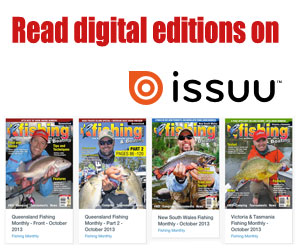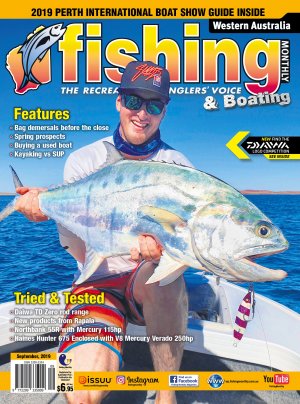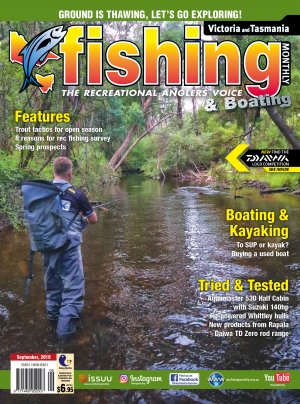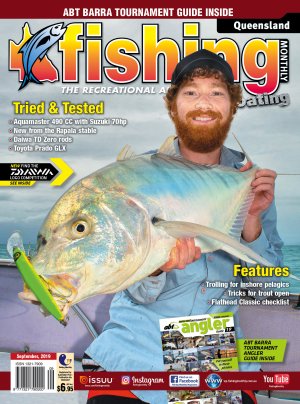Most readers will know Kim through her writings on soft plastics and the like, but last month Kim became the first Australian to fish the Bassmaster Classic, let alone the being the first female angler to qualify.
Kim started serious tournament fishing with the inception of ABT and she is living proof that Australian tournament anglers have what it takes to make it in America.
Following are Kim’s thoughts and words on the journey to the Classic, the Classic itself and dealing with the consequences of fishing in the Classic. It’s a rare insight into what is involved in American tournament fishing.
Over to you Kim.
I've always been into fishing, as some of the photos accompanying this article will attest. Unfortunately, the problem with a long fishing history is that every time there's a new set of limits and closures in my home waters I lament what has been lost over the years. It is crushing. But I also have a motto to try to look on the bright side and find something positive.
I've been writing for QFM in the vicinity of 15 years, I've been in fishing clubs in the Moreton Bay area for 20 years. So on the eve of another state election, with new rules (bans and limits) just coming in and the next round of lies and closures not too far away I asked myself to find something good that I've seen in the recreational fishing game from the last couple of decades.
The longest journey that I've been on in fishing is one as a sponsored angler; and being sponsored (in effect - working for the fishing industry) recently took me all the way to the largest fishing event in the world. The exercise was so successful that I scored four front pages in major US newspapers - from west coast (Los Angeles) to the east coast (Miami Herald) and in Texas and Louisiana. Some quarters would call it the most successful promotion of the sport of recreational fishing in history.
The occasion was being the first female to qualify for and fish in the Bassmaster Classic.
What I'm sure none of those involved really fully had delved into is that despite a facade of equality, fishing is one of the most secretly sexist activities yet to be addressed on this planet. It is not the place here to trot out the proofs of this claim nor is it a bra burning call to arms. One example will do – BASS, the world's largest fishing organisation and with the Bassmaster Classic as their flagship event, originally banned women from competing and had this supported by Federal Court in the USA. This was finally overturned in 1991 and the first females fished in regional events in that year.
Since then, on only three occasions has a female qualified and fished any BASS open end of season championship. I have been that angler on all three occasions, the first being when I was 23 in 2003 - but it wasn't until Feb 2009 that I made it to a Classic. I had no idea how big a deal it would become.
The Classic has run continuously since 1969. I first became aware of the Classic through a computer game that I played when I was 11. The Classic was the culmination of a series of 6 tournaments with the Classic being the grand final. These days the Classic (aka Bassmaster Classic) also gets described as the superbowl of fishing. Given that I'm now 28, it has been 17 years from trying to qualify for the Classic on my computer to actually fishing in it. That's the fishing tale I'd like to tell this month.
Fishing the stocked lakes of Queensland and New South Wales had only just started to develop as a fishery in the early 1990s. Whenever my family would take a trip to a lake, for me it was like the recreation of the fishing that I’d read in American books, seen in videos and computer games.
I tried to find scenarios that fitted – environment, techniques along with fish willing, and then the modifications to make the fish even more willing. If you like, this was my training track; but no one had been down this path before.
This time in my fishing life also has to be considered alongside the other fishing that I was doing. It was more common to find me out on the saltwater. Billfish, mackerel and sharks held my focus on the bluewater. In the estuaries I was a pretty keen lure caster and lure troller for flathead. The freshwater trips came when it was too rough to chase the big pelagics.
I first ventured to America in April 2000 where I got first hand to fish those environments and techniques as they’d been written about. Often I was fortunate enough to fish with developers of the techniques and some of the writers. This started a whole new learning curve for me and for the next 6 years a component of my life became focused on learning these techniques and bringing them back to Australia. This refined my training regime and I now had around a dozen or more viable patterns that an Aussie angler can train to.
Also during my travels in 2000, I watched the 2000 Classic in Chicago.
By 2003 I’d got around to fishing my first BASS event as a co-angler/non-boater. Things started out well with cheques in my first few events and some starry days that put me near the top of the field. By the end of my three seasons as a BASS non-boater I’d qualified for two BASS end-of-season BASS OPEN championships and my best placing in any singular event was 5th overall. Apparently at the time that was a best ever result for a female and also for an Aussie too.
The dream really started to crystallize when I qualified for the 2003 Open Championships and through a series of happenings I landed the job as the new BASS/ESPN fishing commentator where I covered three Bassmaster Classics 2004, 2005 and 2006 – and a Great Outdoor Games for which we won an Emmy award. So there I was with an Emmy in my CV and deciding whether to go fishing or commentating. I decided (hoped) that I could always come back to commentating but that the endurance to slog it out fishing day after day may not always be there.
So for the time being – let us chase the fishing journey and see if that takes us to the end of the rainbow.
No woman angler had ever fished the Bassmaster Classic, although for at least 5 years the quests of a few female anglers’ attempts to qualify for the Classic have been well documented in the fishing media. Hence the interest level had been piqued well and truly. It was now a news story gaining legs.
Then along came the Women’s Bass Tour (WBT). WBT is owned by BASS and ESPN owns them both. In its third full season, 2008, WBT offered the prize that its champion would be the winner of a berth, the 51st berth, in the 2009 Bassmaster Classic on the Red River in Louisiana.
Any who have followed my 2008 WBT season will know that in the events I finished 1st, 4th, 6th, 2nd, and 1st in the five events across the season. Leading the Angler of the Year Points race from start to finish and picking up the WBY AOY and WBT Championship (formerly called the WBT Classic). With the AOY win came the coveted Classic berth.
The WBT season finished in October 2008. Since then the pace to the 2009 Classic was hectic. The media buildup was phenomenal… the outdoor magazines of the USA covered it 100%, it made European fishing magazines (but ironically not much in Australia), national TV news in the USA and at the highest crazy point was that I was on four front pages in USA newspapers and the Sydney Morning Herald on the same day.
I reflected that for the fishing industry the Classic was not about me catching fish.
In fact so much of my fishing industry careers have been more about all the other components other than the actual catching of a fish. If I could give any advice to budding young anglers out there it would to fully grasp that on their day anybody can catch a fish – it is those who do the other things better than most that will find work. I’ve known some very successful writer/photographers who were at best journeymen anglers. And I’ve seen great anglers struggle because they couldn’t understand the camera or worse still how to conduct themselves. Better to find your niche, keep it to yourself and carve it deep.
So back to the Classic; the noise in the stadium when I weighed was the highlight of anything I’ve ever done. The speakers pumped out the song Woman from Aussie band Wolf Mother as my boat was towed out in front of the stage and what they reckon was 10,000 fans in the fully packed auditorium went wild (an equal number had to be turned away from the venue). I experienced this twice, once on each of the first two days of competition.
Ever wondered what it would be like to stand in the middle of the field, to look up into the stands all around and be deafened by the cheers for you? In fishing you get that at the Bassmaster Classic.
Throughout the event the number of girls of all ages, and fathers of daughters that came up to my family to offer encouragement was mind blowing. As mother of the fishing chick, my mum Lynn (QFM’s cooking writer) was often just as popular. People would want to get their photo taken with her, her hand hurt from the numbers of high fives. Mum became a media interview celebrity. Looking after the fans and the media was the biggest part of Classic 39.
As I wrote in my diary/blog: I went to the Bassmaster Classic Outdoors Expo presented by Dick's Sporting Goods today (Sunday, 10 a.m.). I was asked for an autograph and started signing as the queues of hats, shirts, body parts, and Bassmaster Magazine covers multiplied into a conga line. Four and a half hours later, after constant, non-stop Kim Bain-Moore, someone calculated 2000 autographs, security had to be called. With the queue now moving with me and still growing I was escorted by security into a waiting BASS car. Bodyguards for a bass angler? That I never contemplated!
At the weigh-in, the autographs and photographs continued, including one with BASS founder Ray Scott. Reflecting back, I recalled it was me who sought him out for an autograph at the Classic in 2000. That night I went to dinner and I counted them; 24 autographs and photographs between courses.
Amongst all the signings, some fans, some sponsorship offers, stuff for my upcoming TV series; I found new inspiration in the smiling faces of parents and kids.
Since then a couple of weeks have gone by and the autograph signings still happen daily; at the shops, gas station, food outlets, especially at tackle stores and at boat ramps.
I have my own TV fishing show in America these days, and we went straight back into filming after the Classic. So the boat ramp scene can get a little unruly when we are trying to launch and film while giving the fans what they want at the same time.
Two things hit me pretty hard as I began to understand them as they unfolded in front of me during the lead up to and then throughout the Classic.
The first was the absolute hatred and jealously of some men towards women when the girls get a chance to stand alongside of them. Read the memoirs of any lady who has stood alongside men, particularly in sport, and you’ll find out the livid hate that they’ve endured. Surprising is that the men run together to gang up on the girl. I have now seen this first hand in some of the most “first-world” countries on earth.
The second comes about because of the first. There were a large number of older ladies who cheered me on at the Classic. Afterwards I wondered about them… that night about 1am in the morning, I was on my way to the fridge and dad was on his way from the fridge.
Life had been such a blur we hadn’t really had time to speak after the Classic.
“Those old gals,” he said “I’ve figured it out. Those ladies fought for a place in their husband’s fishing boat maybe 50 years ago. Then they gave it up when their sons and daughters came along so that the kids could have a spot.
“Some of those kids are now the older ladies of the sport in 2009.
“You 20-30 year olds are the now breed and it is happening for your age group so that’s why your peers are here.
“The old gals, they were the first to advance the battle, and today was the completion of their journey,” he said.
This has been Kim’s story, a few high points on the path to the 2009 Bassmaster Classic.
One of the reasons that Aussies may be interested in Kim’s achievements is because she has made a good living out of the sport thus far, something dear to the hearts of all tournament anglers and fishing writers. Kim has stepped where few other Australians have and shown that it can be done.
Facts
Top Ten
| Place | Name | Total Fish | Total Weight lb(kg) |
|---|---|---|---|
| 1 | Skeet Reese | 15/15 | 54lb13oz (24.55) |
| 2 | Michael Iaconelli | 15/15 | 54lb2oz (24.50) |
| 3 | Brian Snowden | 15/15 | 52lb14oz (23.65) |
| 4 | Mike McClelland | 15/15 | 52lb1oz (23.59) |
| 5 | Edwin Evers | 15/15 | 51lb5oz (23.16) |
| 6 | Bryan Schmidt | 15/15 | 51lb1oz (23.14) |
| 7 | Kenyon Hill | 15/15 | 49lb14oz (22.29) |
| 8 | Jami Fralick | 15/15 | 49lb2oz (22.24) |
| 9 | Aaron Martens | 15/15 | 49lb1oz (22.23) |
| 10 | Kelly Jordon | 15/15 | 48lb120z (21.83) |
| 47 | Kim Bain-Moore | 7/15 | 12lb2oz (5.45) |
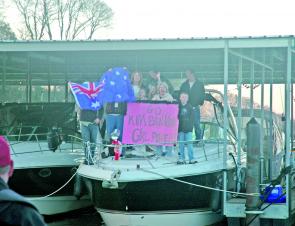
Local fans, expat Aussies, girls and those who like girls. All were there to cheer Kim on at the launch each morning. Up to 2000 spectators braved the freezing conditions each morning to wave every one of the competitors good luck for the day.
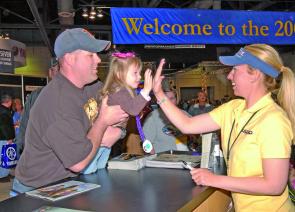
Fans mobbed Kim wherever she went during Classic week.

Newspapers described the media and publicity frenzy as KimBania. A number of major highways into town sported Kim Bain billboards.
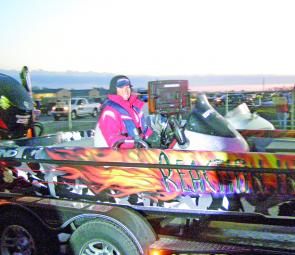
Kim's 21' Legend Alpha 211, 250hp Evinrude and fire breathing Reaction Innovations wrap are one of 51 boats launched in quick succession in the pre-dawn light before daily blast off.

As Kim says, she has always fished. This photo shows her beach fishing in Queensland when she was 6 years old.

